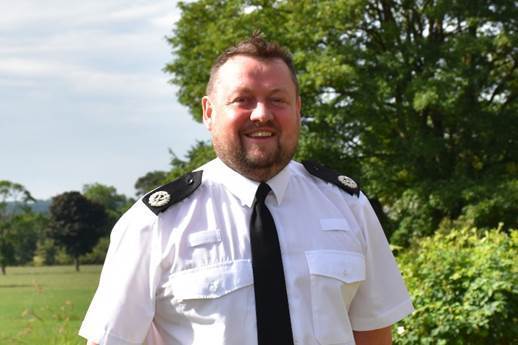
The third most senior police officer in Cumbria says the force can’t “arrest its way out of anti-social behaviour” as he outlines his vision for the force.
Temporary Assistant Chief Constable (Temp ACC) Jonny Blackwell took over the reins from Assistant Chief Constable Andy Slattery last summer, who retired after serving the county for three decades.
The Temp ACC spoke ahead of the announcement of new officers for Cumbria.
“We are seeing 20,000 new police officers nationally and that means we are going to see an increase of 168 police officers here in Cumbria,” he said.
Temp ACC Blackwell admits the influx of officers over the next three years is “not without its challenges”.
He outlined that officers today are subject to much more extensive training and so it would take time before the public will start to see them patrolling the county’s streets.
In the past, officers would complete their training in a matter of weeks, before going out and learning on the beat.
Now they must follow a more academic-led programme, such as a degree or apprenticeship.
Overall, the number of police officers will reach a total of 1,367 in March 2023 – up from 1,199 in 2019 and 1,244 during its previous high in 2007.
One of the biggest challenges is equipping the force’s officers to deal with the ever-changing demands of online crime.
This can be anything from indecent images of children to threats to kill on social media.
“It’s not about recruiting more specialist officers, it is about mainstreaming the digital skills across the force and ensuring everyone understands and is competent and confident about how to deal with it,” said Temp ACC Blackwell.
He believes the force should be a digital constabulary where the ability to tackle online crime is part of the skillset of every officer – no matter their department.
The biggest challenge that the force faces, said Temp ACC Blackwell, continues to be the pandemic.
“We are still wearing masks and we still have a lot of restrictions to keep us safe,” he said.
“We’ve got one of the lowest absence rates in the country which is really positive, which I think is down to the stringent measures we’ve implemented to keep them (force staff) at work.
“We don’t want to see pockets of COVID as it takes staff off duty.”
He said dealing with the added demand for services alongside the staff absences caused by the pandemic, has been tough.
Anti-social behaviour
One of the issues that has reared its head in recent weeks and months is anti-social behaviour, with widespread reports across the county.
The Temp ACC said tackling the problem is one of the force’s priorities.
In Workington, for example, there were 54 incidents of anti-social behaviour reported to police in December. In Keswick, there were five.
“People call it ‘just’ anti-social behaviour, but it can have a massive impact on people’s lives,” said Temp ACC Blackwell.
“We want to get to the heart of the issue. I don’t think you can arrest your way out of anti-social behaviour.
“A lot of the response to anti-social behaviour that can be really effective is problem-solving – understanding why anti-social behaviour is happening.
“Until we understand it fully, we will never get the response right.”
Met Police
The Met Police has faced a string of controversies in recent months, with the murder of Sarah Everard by a serving officer and allegations of racism and sexism within the force.
But are these issues that resonate in Cumbria?
“First of all, we will never shy away from national events,” said Temp ACC Blackwell.
“When we have a devastating national event like the murder of Sarah Everard that causes a national scandal, it rocks people within policing as well.
“People should join policing for a reason – because they want to help, because they want to spend time helping their communities.”
In relation to the accusations of discrimination within the Met Police, he said: “We have to be held to a higher standard in police, and rightly so. At the end of your shift, you are still a police officer, you are a police officer 24/7.”
He believes the way to combat issues surrounding discrimination in policing can be achieved in two ways.
“The first thing is around recruitment,” he said.
“People from black, ethnic communities, women, we need to be appealing to them.
“But we can’t just focus on recruitment. There is always work going on on the male and female split. In the last year, it was similar, that is because we put the effort in and we are successful in making people want to join the service.”
He added that the second part of the jigsaw centres around listening to the concerns of communities who feel underrepresented and responding.








